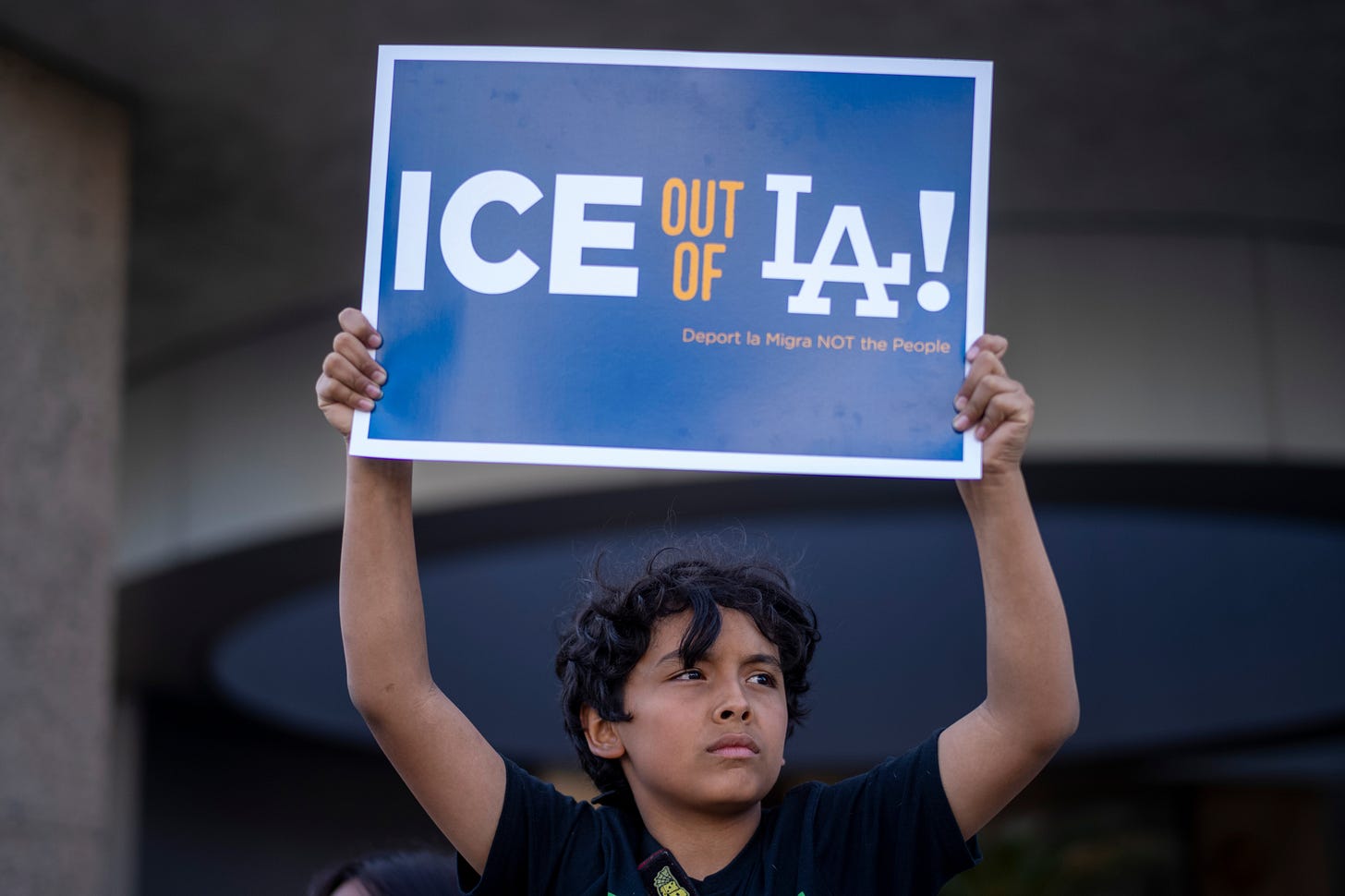The Daily Dose: Bad Advice
Contrary to the view of some, protesting will not enable Trump; it is the only way to defeat him.

Now that Trump has sicced the National Guard on Los Angeles, Tom Nichols has a rather puzzling essay out in The Atlantic calling on the city’s residents to refrain from further demonstrations.
Nichols, a political scientist and longtime Republican, is no fan of the president. He left the party in 2018 over its handling of the Brett Kavanaugh confirmation. But his advice to Los Angelenos that they stay home instead of protesting is wrongheaded, in my view.
“As unsatisfying as it may be for some citizens to hear, the last thing anyone should do is take to the streets of Los Angeles and try to confront the military or any of California’s law-enforcement authorities,” Nichols writes. Protesting will only “give him the authoritarian opening he’s seeking.”
Now that we have transitioned to authoritarianism, there remain no effective restraints on his conduct except for civil resistance such as protests and boycotts.
If protesting is off the table, what would Nichols have us do instead? Nothing? That is exactly what he recommends, it turns out. “What if Trump throws a crackdown and nobody comes?” he ponders:
The most dramatic public action the residents of Southern California could take right now would be to ensure that Trump’s forces arrive on calm streets. Imagine the reactions of the Guard members as they look around and wonder what, exactly, the commander in chief was thinking.
Let us leave aside the matter of what use it would serve to befuddle the National Guard and examine the only other concrete suggestion he has, which is to let the courts handle it. “The law, for most people, is dreary to hear about,” he says, “but one of the most important stories of Trump’s second term is that lawyers and judges are so far holding a vital line against the administration, sometimes at great personal risk.”
Taking to the streets, by contrast, would only further solidify public opinion behind the president on the immigration issue. “Trump is also losing public support, which is another reason he’s zeroing in on California. … The fact of the matter is that tens of millions of Americans believe that almost everything about immigration in the United States has long been deeply dysfunctional.”
Both of these views—that we can rely on judges to rein in the president's excesses and that the main battle ahead is to win over public opinion—rest on the assumption that American democracy continues to function.
It does not. Nichols’s call to deprive Trump of the “authoritarian opening he's seeking” presumes that he has not yet succeeded in bringing authoritarianism about. But as I have explained repeatedly, he has.
Authoritarianism is here, and it requires that we shed many of our old assumptions about how power is gained and maintained in this country. That is because the old ways of checking presidential abuses are no longer sufficient.
Let us say that Trump tries to stay in power despite an election defeat—which, let’s face it, is an inevitability if he loses. What, if anything, could make him reverse course?
The answer is nothing—except, that is, the only thing that Nichols would like us not to do: take to the streets. (By the way, do you know what could really sour the public on Trump? The sight of troops brutally beating protesters on Sunset Drive.)
“The American system of government,” he writes, “was never meant to cope with a rogue president.” True enough. So then why is he asking us to rely on that very system to do what even he says it was never meant to achieve?
Think about it: If and when a federal judge holds the Trump administration in contempt, who is going to enforce the ruling? His own Justice Department? When he inevitably tries to steal the 2028 election, what is going to make him leave office? Bad opinion polls? Or perhaps the very federal courts he is already defying?
The fact is, now that we have transitioned to authoritarianism, there remain no effective restraints on his conduct except for civil resistance like protests and boycotts.
To be sure, any such resistance should remain nonviolent and certainly unarmed. In general, nonviolent resistance is far more effective than the violent sort. On this, the data is clear.
But to discourage any form of protest, whether violent or non-violent, is to throw away the only means we have of checking Trump’s authoritarianism.
Protesting is not what will enable Trump. The only thing that will is not protesting. The sooner we recognize this, the sooner we can bring his regime to an end.


All of America must protest in solidarity with LA. And even the Western world, because if Trump wins there, it will be the first step for Trump-Putin-Xi's win over democracy all over the world.
I do agree with what you say. Thank you for taking a stand.